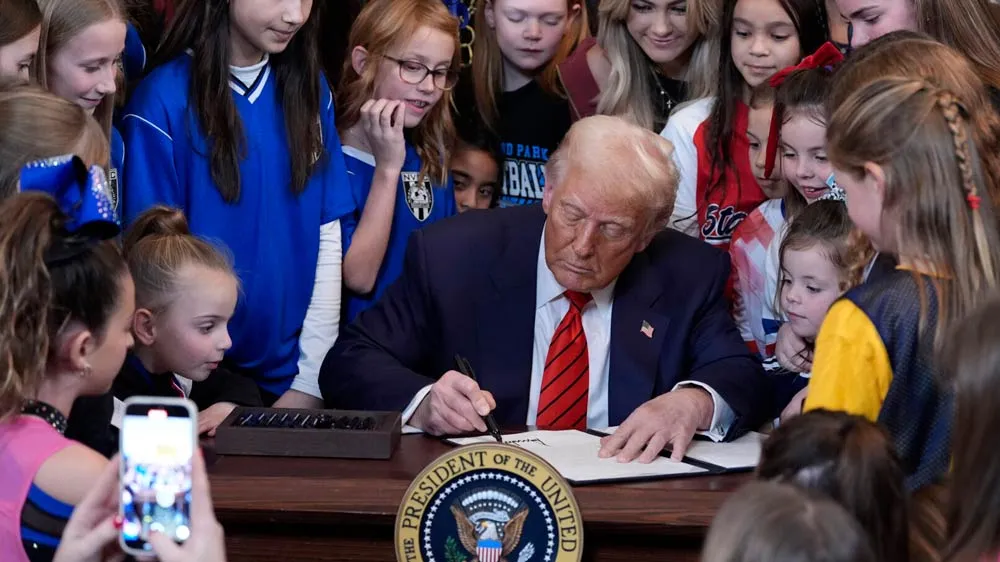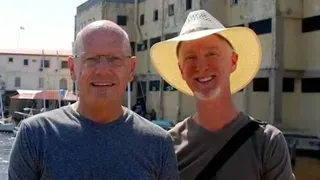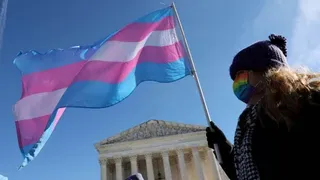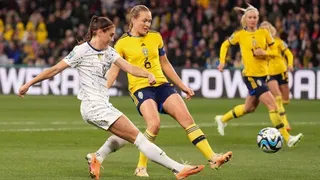November 17, 2013
Was Quinn's Loss in New York a Setback for LGBT Equality?
Steve Weinstein READ TIME: 7 MIN.
Christine Quinn's failed campaign to become New York City's first out-LGBT and female mayor has aroused a debate about whether we have moved beyond identity politics and into a "post-gay" political universe.
In the New York City Democratic mayoral primary that was held on Sept. 10, out-lesbian speaker of the City Council Quinn didn't quite go from first to worst, but it was close. She placed third in a field of five, besting only the city's comptroller, who is embroiled in a campaign finance scandal, and Carlos Danger, a/k/a Anthony Weiner.
Quinn's campaign implosion prompted some to question New York City's reputation as a liberal bastion. The New York Times published a hand-wringing analysis and a long-form documentary that argued voter antipathy to a female, lesbian mayor.
Others - including gay men and, yes, lesbians - have come to the nearly opposite conclusion. Widespread LGBT support for victor Bill de Blasio signified that we have moved beyond identity politics to support the most progressive candidates who reflect our beliefs, regardless of sexual orientation. Rather than blaming voters mired in homophobia and misogyny, they place the blame squarely on Quinn herself.
Everyone can agree on one thing: When Quinn announced her candidacy; she was the clear front-runner in the campaign for mayor. Unfortunately for Quinn, third term disenchantment with Mayor Michael Bloomberg doomed the chances of the woman deemed his anointed successor.
FROM OUTSIDER TO INSIDER
Quinn's political career began in her mid-twenties, when she managed the City Council campaign of Tom Duane, an out-gay politician running against an entrenched party machine in the city's major gayborhoods, Greenwich Village, Chelsea and Hell's Kitchen. Duane became one of the first of two openly gay city council members, and the first American politician to publicly reveal his positive HIV status. After five years as Duane's chief of staff, Quinn's heading of the Anti-Violence Project, which fights gay-related crimes and provides support to victims, made her a de facto spokesperson for the city's gay community.
When Duane moved on to the State Senate, Quinn took his place in the City Council. Being elected by her peers as speaker in 2006 made her the second-most powerful position in city government after the mayor. During her tenure as speaker, Quinn fought Bloomberg on issues like his veto and court fight against a bill that would have required any vendor doing business billing the city for more than $100,000 to provide equal benefits to same-sex partners and legal spouses of its employees. Since the City of New York has such a huge budget and businesses from around the country bid for contracts, it would have effectively ensconced spousal benefit equality as the de facto law of the land.
Many, however, saw her as moving too close to the mayor and the city's elite class, particularly real estate developers. In retrospect, more than anything, her controversial support of Bloomberg's suspension of term limits in the face of two separate voter referenda doomed her candidacy. While Quinn was busy chalking up endorsements from business and political leaders and aging liberal icons like feminist Gloria Steinem, a small, but vocal cadre of LGBT opponents were dogging her on the Internet and at campaign stops.
Quinn's staffers should have taken more notice of the star-studded host list for a spring de Blasio fundraiser. Many of the city's most notable LGBT personalities had apparently followed "Sex in the City" actress Cynthia Nixon's early and ardent support. In the end, de Blasio had clearly became the choice for progressives - clear, that is, to everyone but the Quinn campaign, which ignored the groundswell in a community that was long her political base. According to exit polls, two-thirds of LGBT voters in the Sept. 10 primary cast their ballots for other candidates, the vast majority for de Blasio.
IN HILLARY’S FOOTSTEPS
The New York Times post-mortem recognized that "exit polls showed no gender gap in the results." But it also questioned whether it was "simply too much to expect the electorate to embrace a candidate who would be not just New York's first female mayor, but its first openly gay one, too."
David Mixner, the well-known gay-rights activist and blogger who was one of Quinn's most ardent supporters, was reminded of the 2008 presidential primary, when Hillary Clinton "was viewed as the front runner, but Obama became the agent of change." It was, he told EDGE, "the same here. On the City Council, Quinn had to deal with Bloomberg." Her loss was "as much about the concept of change" as Obama's victory. That said, Mixner agreed with the Times that Quinn's sexual identity was definitely a factor, because "20 percent said they wouldn't vote for an LGBT mayoral candidate."
Of the major national and local LGBT organizations united behind Quinn, none did so more ardently than the Gay & Lesbian Victory Fund who hosted champagne brunches across the country to raise money for her campaign. Victory Fund President and CEO Chuck Wolfe recognized that voters were more concerned with local issues rather than making history. "This particular race, as in every political campaign, comes down to the people in the race," he told EDGE. "If one person does very well, it means that person did a better job of securing a block of voters" - in this case, progressives, a middle class that fears being pushed to the brink of extinction and minorities who oppose the police's policy of stopping youth of color for no apparent reason.
Wolfe cited Quinn's legwork behind the scenes to help get a marriage-equality bill through the State Legislature in 2011, which included lobbying trips to Albany, the state capital, as an example of how a senior out-gay elected official can influence policy. But it also demonstrated for Wolfe the LGBT anti-Quinn faction's selective memory. "So many people forgot Quinn's work for marriage equality," Wolfe said.
Quinn supporters, including Duane, are appalled by what they see as, in Mixner's words, "the depth of hatred of the LGBT opposition to Quinn," which he called "appalling. This is someone who has given her life to public service. She didn't deserve the amount of vitriol directed at her."
A BLIP IN THE ROAD?
Maybe so, but a look at the bigger picture paints Quinn's defeat as a blip in the road to political power. In 2012, LGBT candidates ran for one office or another in nearly every state. Tammy Baldwin became the first LGBT U.S. senator. Marriage equality won in every state where it was on the ballot. A bigger watershed probably occurred one year prior..
In 2011, three out of four of the more than 60 LGBT candidates nationwide won. The highest-profile victory was Annisse Parker winning a second term as mayor of Houston. Parker had the backing of the city's powerful business community and even many conservative groups, who liked her fiscal policies and tight running of City Hall.
More significant were the lesser-known lower-level victories in some of the nation's most conservative areas, such as Charlotte, N.C.; Missoula, Mont.; Houston again; and Indianapolis, where city councils would all be welcoming their first openly LGBT members. Many consider 2011 the year when, in much if not most of the country, being gay ceased to become an issue.
Does the fact that so many LGBT voters didn't vote for Quinn indicate, as Joe Jervis (the blogger who writes under the name JoeMyGod) once told me, "we finally have the luxury of not just automatically backing a candidate because she's gay."
No, said Wolfe. "People can overanalyze what an actual election comes down to," he cautioned. "That kind of thing can stick and it's not real."
For Mixner as well, Quinn's defeat is a defeat for the city's LGBT community; the importance of having one of our own occupy the highest office in the state's power base would be far more than symbolic. "Will a person's sexual orientation make a difference in how they govern?" he asked. "Yes, because who they are will make a difference in how they see the world and tackle certain things. Is there still a need to elect people from our own community? Yes, if you think the people representing us should represent the community.
"If there are two candidates equally qualified, I wouldn't hesitate to vote for the gay one," Mixner added. "We're still a long way from total acceptance, and any time a gay politician has won public office, it has been better for our side."
"In New York City, you can make the argument that we have full equality," said Wolfe, who then added a reference to transgender exclusion from the state's anti-discrimination law as an example that, while we may have won significant battles, we have to win the war. "Some people argue that we're now 'post-gay' or it's irrelevant. But if you're a gay kid in Kansas, does that mean we're 'post-gay' there? We have had identity politics since the country was founded."
Steve Weinstein has been a regular correspondent for the International Herald Tribune, the Advocate, the Village Voice and Out. He has been covering the AIDS crisis since the early '80s, when he began his career. He is the author of "The Q Guide to Fire Island" (Alyson, 2007).






